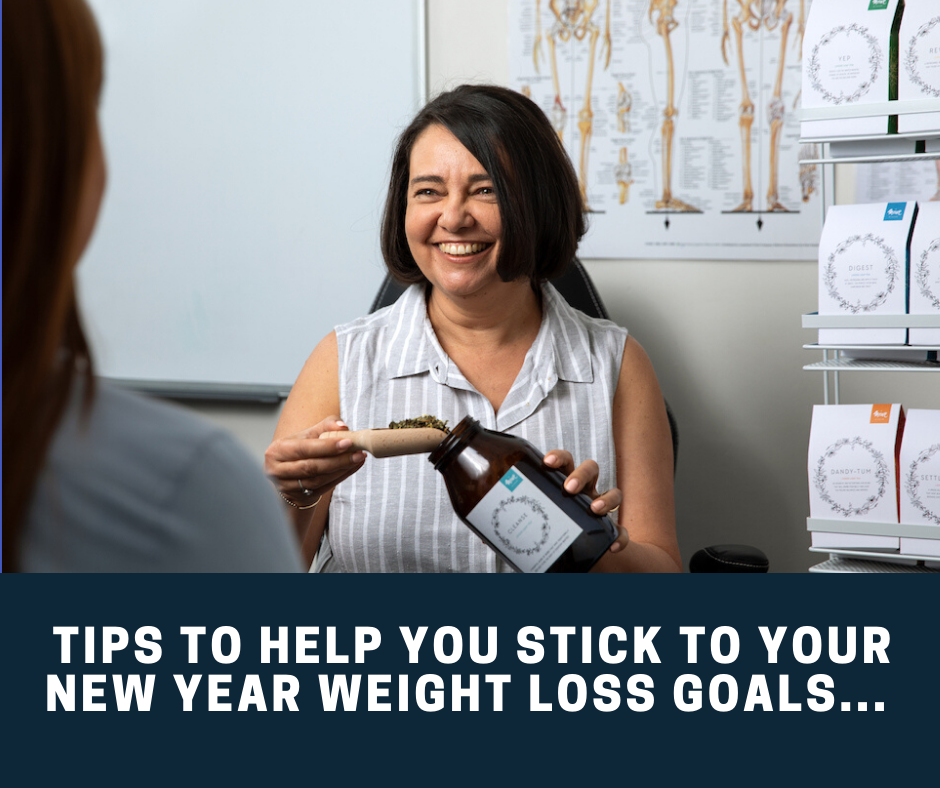

Naturopath and Nutritionist Marina Moscato
They say a new year is a new beginning, so it’s a perfect time to make some resolutions. The reality is that most of our new year’s resolutions don’t even make it past the second week of January.
Chances are, you’ve made a resolution to lose weight, and you’re also going to join the gym (and actually go this time). This year, before your resolutions fly right out the window, let’s try a different approach. Start small, be realistic, and break down the big, daunting tasks into more manageable ones!
Weight loss – just how fast can I go?
It’s a sad reality that there is no (healthy) quick fix to weight loss. There are no magic pills or special diets that will miraculously make you lose 10kg in a week, Nor is there is no one diet that is better than another. People are individual and what works for one may not work for another. So rather than setting a goal to lose 20kg by Australia Day, keep your weight loss goals realistic- .5 to 1kg per week is both sensible and achievable for most, however if you have ‘quite a bit’ to lose, then 1kg per week is doable with the right approach.
What’s the naturopathic approach to weight loss? The naturopathic approach for almost every condition to allow a month of healing for every year that you’ve had the condition. Therefore, if you have been overweight for 20 years, allow yourself 20 months to achieve your goal. You didn’t gain that weight in a week; therefore, it would be totally unrealistic to expect to lose that weight in a week.
What does the science tell us about weight loss? A literature review published in the Current Gastroenterology Reports (Dec, 2017) titled “Popular Weight Loss Strategies” reviewed the trend of juicing or detoxification diets, intermittent fasting, the paleo diet, and high intensity training. The study found “there are limited studies that actually suggest these particular regimens are beneficial and lead to long-term weight loss. Juicing or detoxification diets tend to work because they lead to extremely low caloric intake for short periods of time, however tend to lead to weight gain once a normal diet is resumed. Both intermittent fasting and the paleo diet lead to weight loss because of overall decreased caloric intake as well. Lastly, high intensity intermittent training (HIIT) have shown improvements in cardiovascular health”.
Can supplements help with weight loss? There are many supplements and herbal preparations that can assist with weight loss. For example, Chromium picolinate has been shown to improve body composition by maintaining lean body mass. Chromium is an essential trace mineral involved in carbohydrate, fat and protein metabolism and is combined with picolinic acid to enhance absorption. It facilitates the action of insulin and has been shown to improve glycemic control.
‘rather than setting a goal to lose 20kg by Australia Day, keep your weight loss goals realistic’
Marina Moscato
In a study conducted by Wang et al. titled Effects of catechin enriched green tea (Camellia sinensis) on body composition (2010) found green tea (which is comprised of catechins and caffeine), had an effect on body weight and body composition in moderately overweight subjects for 90 days without any calorie restriction. Which resulted in the greatest percent decrease in intrabdominal and total fat mass and total body mass. Similarly, daily consumption of a beverage containing 625 mg catechins and 39 mg caffeine/day for 12 weeks resulted in greater total weight loss and fat mass loss in the abdominal area compared to placebo.
So what’s the best approach to weight loss? Treat weight loss as a marathon and not as a sprint. Here are some tips that may keep you on track:
- Rather than setting a goal to lose 20kg by Australia Day, keep your weight loss goals realistic.
- Write your goal down.
- Break it up into months, and include in your goals where you’d like to be at the end of each month.
- Put your goals on the fridge – otherwise it’s out of sight, out of mind and this also lets others in your household know what you are trying to achieve.
- Follow the 80/20 rule. Stay on track 80% of the time and have a cheat meal once a week.
- Don’t be too hard on yourself. If you fall off the wagon for a meal, just get back on for the next meal. Remember January 1 is just a date, don’t let it define your goals.
- Watch the calories that you drink. Juice may seem like a healthy option but it’s really just glucose and water with very few nutrients.
- Don’t buy into the “fad diet craze”, marketing is very powerful and when your scrolling through Facebook at night, it’s easy to be sucked in.
- Stay hydrated with water or herbal tea. The goal is about 2lts per day but gradually build up to that. Remember that black tea and coffee are diuretics so aren’t included in the 2ltr a day goal.
- SLEEP is crucial to weight loss. According to research published in the Annals of Internal Medicine dieters were put on different sleep schedules. When their bodies received adequate rest, half of the weight they lost was from fat. However, when they cut back on sleep, the amount of fat loss was cut in half, even though they were on the same diet. The dieters also felt significantly hungrier (because their ghrelin levels were elevated), were less satisfied after meals, and lacked energy to exercise. Overall, those on a sleep-deprived diet experienced a 55 percent reduction in fat loss compared to their well-rested counterparts.
Not all diets are created equally, people are individual and at different stages of life and research can be biased. Seek the help of a qualified professional such as a nutritionist or a naturopath to assist you to achieve your goals.
Marina Moscato is a Naturopath and Nutritionist at Ryde Natural Health Clinic.
